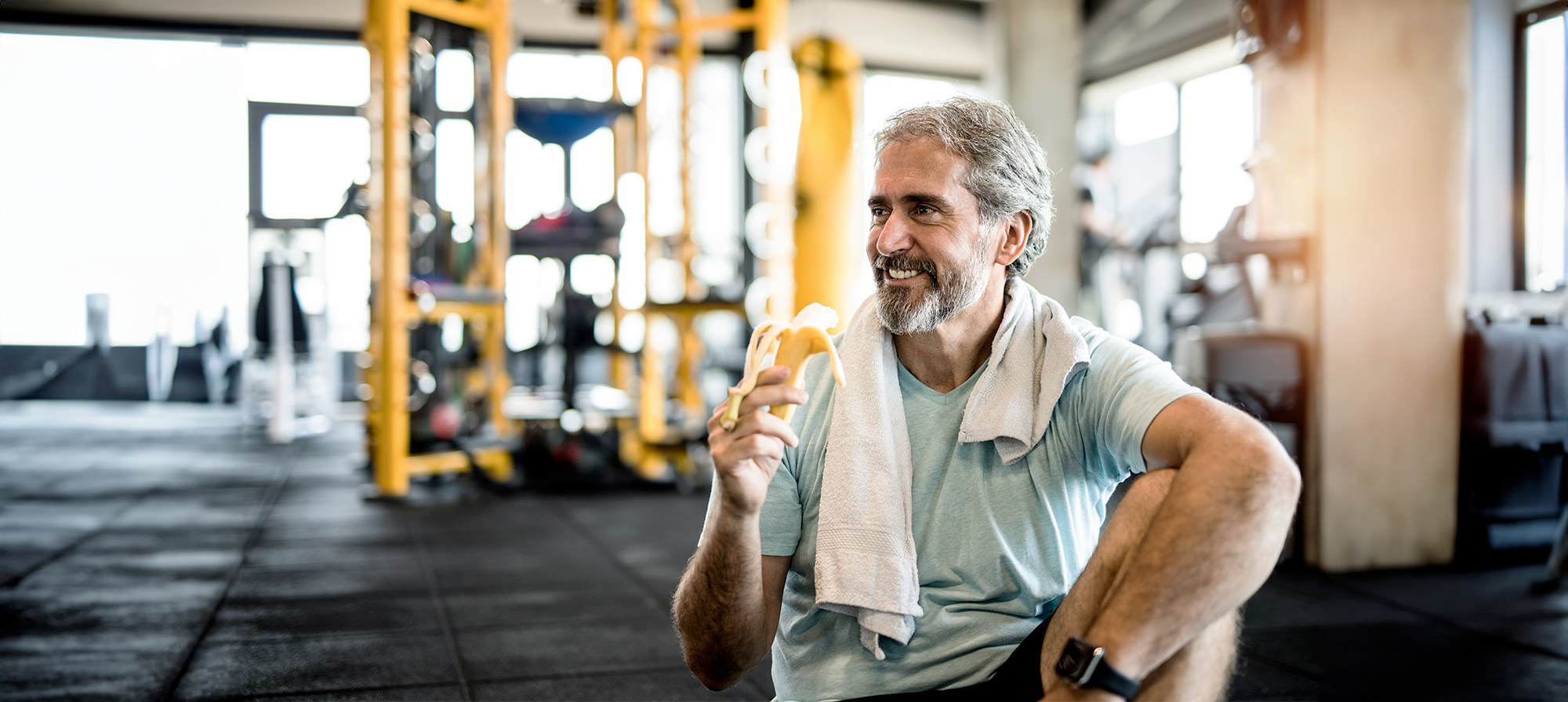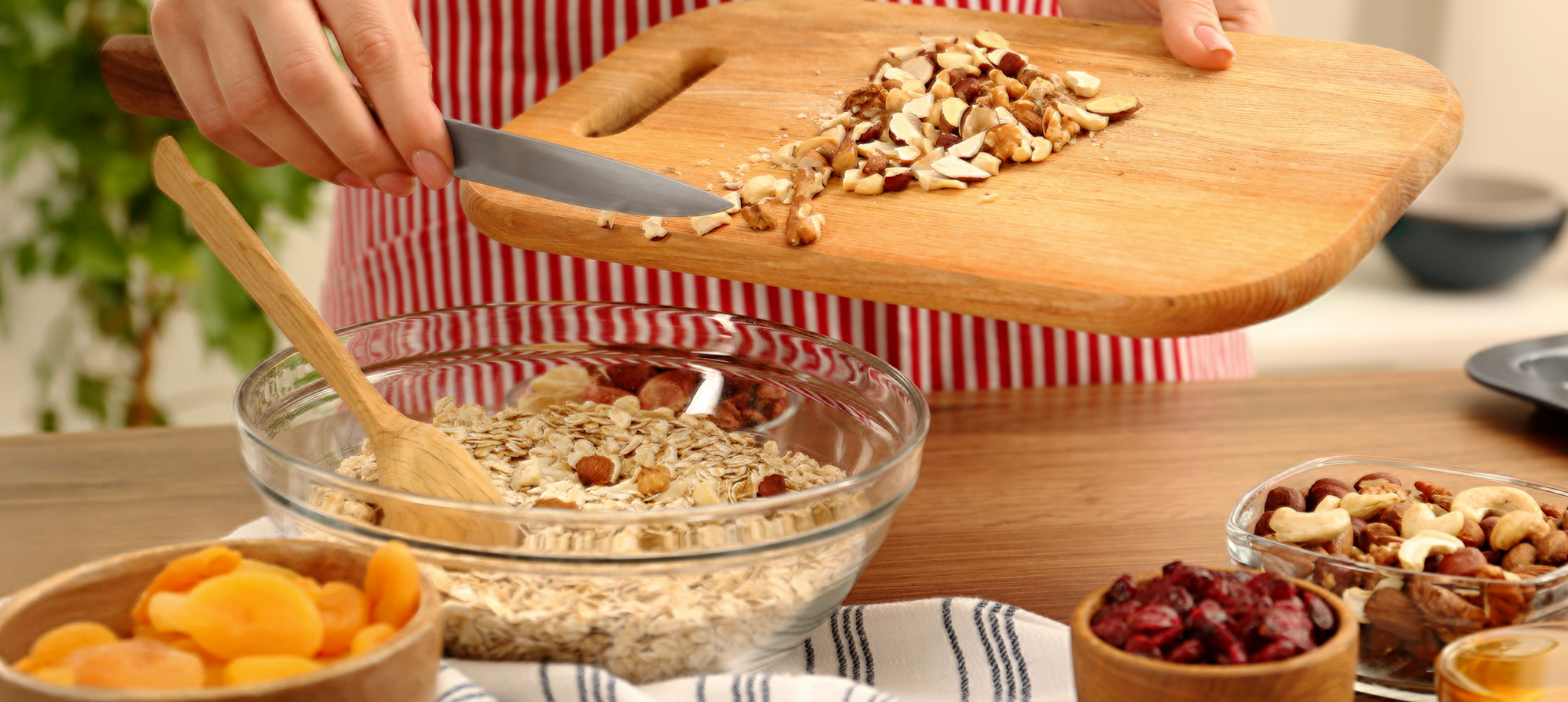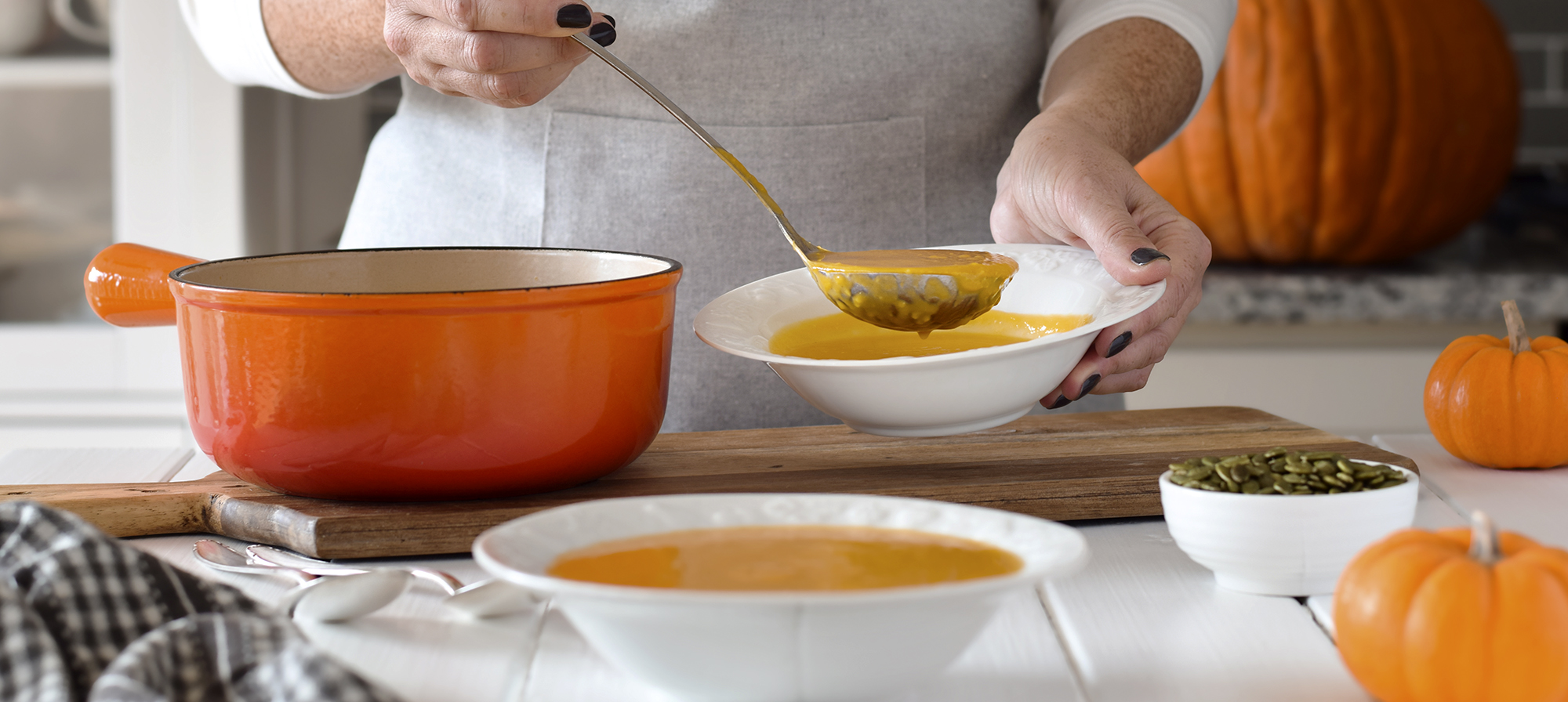Fitness and nutrition are 2 sides of the same coin. So, focus on getting the right nutrients—at the right time—in your pre- and post-workout snacks.
The key to getting the most out of your workout is to nourish your body before and replenish it after. The right pre-workout snack will give you the energy you need to power through your workout. And the right post-workout snack will help repair your muscles and restore energy.
Eating before and after exercise
When it comes to fueling your workout beforehand, carbs are key. They give your body energy it can use right away. After exercise, eat carbs plus protein. Carbs help restore energy to your muscles—protein helps repair them.
But it’s not only about what you eat. It’s also about when. Timing your snacks correctly can help you get the most nutritional bang for your buck. It can help optimize your workouts so you can make the most fitness gains! 
Energizing your body with a pre-workout snack
Plan to have a carb-based snack about 30 to 60 minutes before you work out. A little protein helps, too. But protein takes longer to digest, so you don’t want a lot—yet. You’ll need more after exercise to help your body recover.
Limit fat and fiber in your snack, too. Some is OK, but like protein, these take longer to digest and may even upset your stomach. Of course, it is important to get fiber and healthy fats in your overall daily diet. But for your pre-workout snack, focus on foods you can digest easily. Experiment to find what works best for you.
You may be wondering whether you should eat before exercising if you’re trying to lose weight. The answer is yes. Exercising on an empty stomach can actually decrease your performance. Without food to fuel you, you may feel more fatigued, which can diminish how hard and long you’re able to work out. It can also increase your risk of injury.
By giving your body energizing carbs, you can get a better workout. That means you can burn more calories and build more muscle. And getting more physically fit can boost your overall health, whether you lose weight or not.
Here are a few pre-workout snack ideas to invigorate you:
- Peanut butter and banana sandwich: The bread and bananas provide carbs for a boost of energy. The peanut butter provides a little protein and fat to fuel your workout longer.
- Oatmeal with berries: The complex carbs in this snack help provide a steady release of energy. Plus, the berries are chock full of vitamins and antioxidants. Top it with a few nuts or seeds for a bit of protein.
- Apple slices with nut butter: Like the peanut butter and banana sandwich, the fruit provides carbs for a quick energy blast. And the nut butter helps keep you going.

Restoring and repairing with a post-workout snack
Exercise breaks down muscle and uses up your glycogen stores, the main source of energy for your muscles. So, after sweating it out, your muscles need to recover. The right post-workout snack will help repair them and restore your energy.
About 30 minutes after you exercise, eat a snack that is 3 parts carbs to 1 part protein. This combo is vital for recovery. The carbs help replenish your glycogen stores. The protein provides amino acids to help repair and build your muscles .
Here are a few post-workout snack ideas to help you refuel:
- Chocolate milk: Make your own chocolate milk to avoid additives often found in store-bought brands. Add cocoa powder and maple syrup to the milk of your choice for a quick homemade glass. Chocolate milk contains more carbs than regular milk and has protein to boot. Plus, it can help you rehydrate.
- Fruit smoothie with Greek yogurt: Much like chocolate milk, a fruit smoothie with Greek yogurt will provide carbs, protein, and hydration.
- Whole grain wrap with turkey and veggies: Turkey is a great source of lean protein, while the whole grain wrap and veggies are a source of complex carbs.

Staying hydrated—all day long
Hydration is important for your general health—and it’s key to any workout. So, on workout days, pay extra attention to your water intake. Make sure to drink plenty before and after exercise, and sip on it while you work out.
Learn about the risks of dehydration.
If you’re doing a long or high-intensity workout, you may need to replace electrolytes, too. A sports drink or other electrolyte drink can help in that case. Check the label and look for drinks without added sugar, artificial flavors, or preservatives. Or, think about making your own electrolyte drink at home .
However, if you don’t need electrolytes, drinking them may cause an imbalance. They can even be harmful if you have hypertension or are sensitive to salt. Typically, water is the best choice for hydration. Talk with your doctor before consuming sports drinks, especially if you have any health conditions.
Fitness doesn’t happen in a vacuum. You need the right nutrition, too. Plan ahead to nourish your body with pre- and post-workout snacks. Then see how much more you can do in—and get from—your workout! 
Not a Silver&Fit® member? Learn more about everything the program has to offer, including more helpful healthy living tips like this, here on our website.
This information is not intended to take the place of regular medical care or advice. Please check with your doctor before using this information or beginning any self-care program. Images used for this article do not depict any members of the Silver&Fit Program.
References
American Council on Exercise. (2008). Fit facts: Healthy hydration. https://acewebcontent.azureedge.net/assets/education-resources/lifestyle/fitfacts/pdfs/fitfacts/itemid_173.pdf
Beck, K. L., Thomson, J. S., Swift, R. J., & von Hurst, P. R. (2015). Role of nutrition in performance enhancement and postexercise recovery. Open Access Journal of Sports Medicine, 6, 259–267. https://doi.org/10.2147/OAJSM.S33605
Evolution Nutrition. (2015, April 23). Pre- and post-workout nutrition for strength training. American Council on Exercise. https://www.acefitness.org/resources/pros/expert-articles/5390/pre-and-post-workout-nutrition-for-strength-training/
Hawley, J. A., & Leckey, J. J. (2015). Carbohydrate dependence during prolonged, intense endurance exercise. Sports Medicine, 45(1), 5–12. https://doi.org/10.1007/s40279-015-0400-1
Mayo Clinic. (2021, February 23). Nutrition rules that will you’re your workout. https://www.mayoclinic.org/healthy-lifestyle/nutrition-and-healthy-eating/in-depth/nutrition-rules-that-will-fuel-your-workout/art-20390073
Mohr, C. R. (2019. September 19). Timing your pre- and post-workout nutrition. eatright.org. https://www.eatright.org/fitness/physical-activity/exercise-nutrition/timing-your-pre-and-post-workout-nutrition
Murphy, L. (n.d.). Nutrient timing: Pre and post-workout questions answered! National Academy of Sports Medicine. https://blog.nasm.org/workout-and-nutrition-timing
Rodriguez, N. R., DiMarco, N. M., Langley, S., American Dietetic Association, Dietitians of Canada, & American College of Sports Medicine: Nutrition and Athletic Performance (2009). Position of the American Dietetic Association, Dietitians of Canada, and the American College of Sports Medicine: Nutrition and athletic performance. Journal of the American Dietetic Association, 109(3), 509–527. https://doi.org/10.1016/j.jada.2009.01.005
Urban, A. (2023, September 14). Hydration: Are electrolyte drinks better than water. University of New Hampshire. https://extension.unh.edu/blog/2023/09/hydration-are-electrolyte-drinks-better-water
This article was written by Keleigh Somes, edited by Gail Olson, and clinically reviewed by Elizabeth Thompson, MPH, RDN on January 16, 2024.





